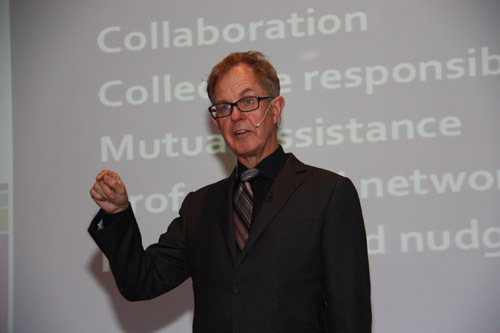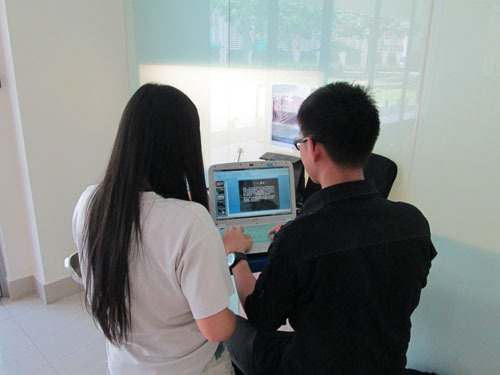
“Schools are driven to place too much emphasis on test scores that capture what can easily be measured. In doing so, they neglect other important skills and qualities that are difficult to quantify.” — Andy Hargreaves
A new report, Data-Driven Improvement and Accountability, authored by Boston College professors Andy Hargreaves and Henry Braun, offers recommendations for establishing more effective systems and processes for evaluating performance of schools. The report explains how the current system of student data collection more often than not creates “perverse incentives” for educators to narrow curriculum, teach to the test and allocate their efforts disproportionately to students who yield the quickest test-score gains, rather than those with the greatest needs. The authors claim the flawed use of data-driven improvement and accountability (“DDIA”) in much of U.S. Education has significant ramifications, since the system has become “driven” versus “guided” by test scores. In these circumstances, educational accountability that is intended to contribute to student improvement can actually impede improvement for students.
“When accountability is prioritized over improvement, DDIA neither helps educators make better pedagogical judgments nor enhances educators’ knowledge of, and relationships with their students,” comments Braun. “Schools are driven to place too much emphasis on test scores that capture what can easily be measured. In doing so, they neglect other important skills and qualities that are difficult to quantify,” adds Hargreaves.
The drive to enhance school performance and learning outcomes for all students has been an educational priority for the last three decades, often creating conflicts between policymakers and educators. There has been major debate over the emphasis on test scores. Hargreaves and Braun argue that our thinking is too narrow. They raise the question: Are we using this data as effectively as we could or has it become a substitute for professional judgment? They contend that data should guide educators in terms of providing feedback, allowing schools to see the problem areas, and intervene and make the necessary student and/or teaching improvements as needed. Additionally, does this data alone properly reflect what students know? Does it measure all that we value?
And so, what would be the alternatives to the policy tools we currently rely on for school performance? Hargreaves and Braun point out that professional judgments and interventions would need to be based on a wide range of evidence and indicators that properly reflect what students should be learning. They draw comparisons with uses of data in business and professional sports, e.g. the Oakland Athletics, the first baseball team to rely on players’ performance statistics for recruitment. “The point being,” adds Hargreaves, “effective teams use data but the data are valued by everyone, and analyzed together with shared responsibility for improvement.” Additionally, high performing educational systems around the world use systemic reforms to promote collective responsibility for improvement. Top down accountability is a last resort in these countries.
Accompanying the report is model legislation authored by attorney Kathy Gebhardt, executive director of Children’s Voices. Based on the Hargreaves and Braun brief, the legislation details how data could be used effectively to create a multi-level system of accountability designed for school improvement.
Hargreaves’ and Braun’s brief concludes with twelve recommendations for establishing more effective systems and processes of Data-Driven or Evidence-Informed Improvements and Accountability.
To review the Hargreaves/Braun report: http://nepc.colorado.edu/publication/data-driven-improvement-accountability
Andrew Hargreaves is the Thomas More Brennan Professor of Education in the Lynch School of Education. Henry Braun is the Boisi Professor or Education and Public Policy in the Lynch School of Education.

Andy Hargreaves, C. M. Rubin, Henry Braun
Photos courtesy of Andrew Hargreaves and Henry Braun.
In The Global Search for Education, join me and globally renowned thought leaders including Sir Michael Barber (UK), Dr. Michael Block (U.S.), Dr. Leon Botstein (U.S.), Professor Clay Christensen (U.S.), Dr. Linda Darling-Hammond (U.S.), Dr. Madhav Chavan (India), Professor Michael Fullan (Canada), Professor Howard Gardner (U.S.), Professor Andy Hargreaves (U.S.), Professor Yvonne Hellman (The Netherlands), Professor Kristin Helstad (Norway), Jean Hendrickson (U.S.), Professor Rose Hipkins (New Zealand), Professor Cornelia Hoogland (Canada), Honourable Jeff Johnson (Canada), Mme. Chantal Kaufmann (Belgium), Dr. Eija Kauppinen (Finland), State Secretary Tapio Kosunen (Finland), Professor Dominique Lafontaine (Belgium), Professor Hugh Lauder (UK), Professor Ben Levin (Canada), Lord Ken Macdonald (UK), Professor Barry McGaw (Australia), Shiv Nadar (India), Professor R. Natarajan (India), Dr. Pak Tee Ng (Singapore), Dr. Denise Pope (US), Sridhar Rajagopalan (India), Dr. Diane Ravitch (U.S.), Richard Wilson Riley (U.S.), Sir Ken Robinson (UK), Professor Pasi Sahlberg (Finland), Professor Manabu Sato (Japan), Andreas Schleicher (PISA, OECD), Dr. Anthony Seldon (UK), Dr. David Shaffer (U.S.), Dr. Kirsten Sivesind (Norway), Chancellor Stephen Spahn (U.S.), Yves Theze (Lycee Francais U.S.), Professor Charles Ungerleider (Canada), Professor Tony Wagner (U.S.), Sir David Watson (UK), Professor Dylan Wiliam (UK), Dr. Mark Wormald (UK), Professor Theo Wubbels (The Netherlands), Professor Michael Young (UK), and Professor Minxuan Zhang (China) as they explore the big picture education questions that all nations face today. The Global Search for Education Community Page
C. M. Rubin is the author of two widely read online series for which she received a 2011 Upton Sinclair award, “The Global Search for Education” and “How Will We Read?” She is also the author of three bestselling books, including The Real Alice in Wonderland.
Follow C. M. Rubin on Twitter: www.twitter.com/@cmrubinworld






Recent Comments